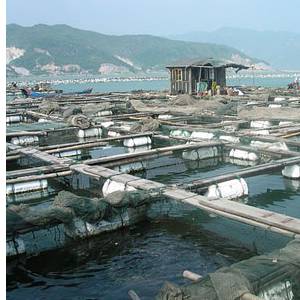When you think of where the fish on your plate comes from, you’re probably conjuring images of the great wide ocean where the animals live free until a few small boats come along and scoop them up. In reality, huge nets are often cast into the open waters that catch everything and anything that get in their way, including millions of “nontarget” animals. And even this reality, which is already questionable because of the environmental havoc it wreaks on the entire marine ecosystem, is now changing.
You might be surprised to discover that just as birds, pigs, and cows are crammed inside massive facilities known as factory farms, an increasing number of fish are, too. It’s referred to as aquaculture. In fact, aquaculture accounts for nearly half of global fish production, to the tune of about 57.8 million tons per year.
Aquaculture is, at best, the intensive confinement of fish in order to raise and kill massive quantities for human consumption. Huge underwater nets or ponds (with foreign species introduced) serve as cages for large populations of fish. Just as with factory farming of other species, packing large numbers of animals into small spaces leads to concentrated amounts of fecal waste that pollute the environment. To keep fish alive in such squalid living conditions, they’re often pumped antibiotics, which is another potential source of pollution and it also raises concerns about human health issues with antibiotic resistance.
Beyond common concerns for the environment and human health, there’s the obvious fact that intensive confinement is not in the best interest of fish themselves. Sure, fish may look and act differently than our cats and dogs at home, but fish are complex and intelligent animals–did you know they use tools?— who are capable of feeling pain.Yet sadly, fish are often the forgotten victims on our plate.
What can you do? The most effective way we can protect fish–and all animals–is to simply not eat them. Choosing the vegetarian versions of our favorite foods, even “seafood,” is getting easier every day. Visit TryVeg.com today to get started, and be sure to also check out Sophie’s Kitchen to discover all-vegan fish fillets, calamari, shrimp and more.

